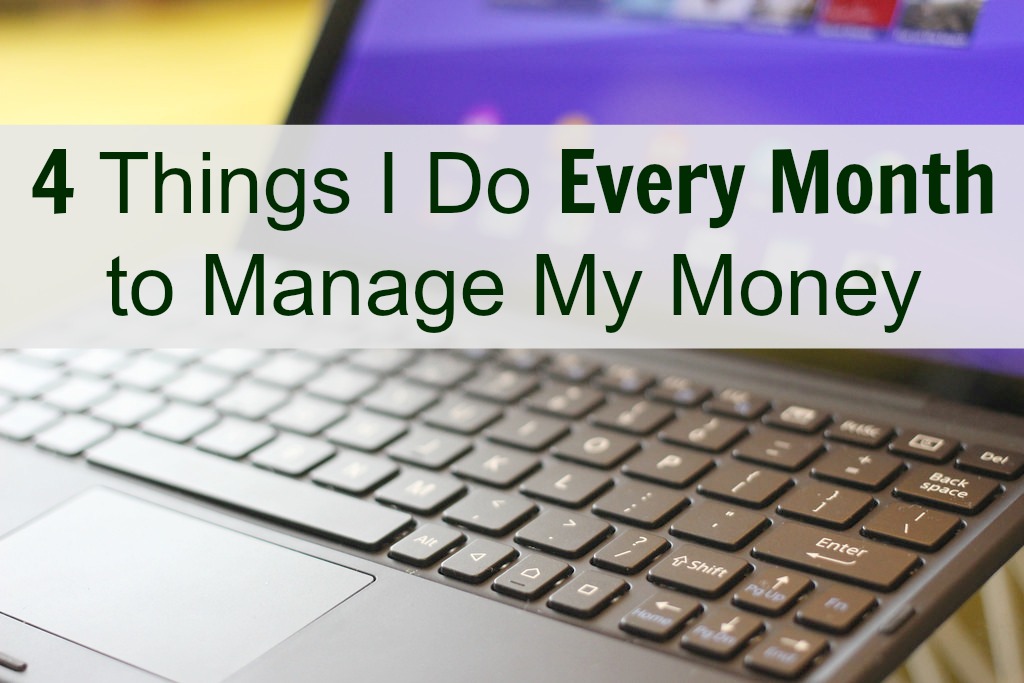
Have you ever stopped and thought about what you do every month to manage your money?
Or what you should do every month to manage your money properly?
Years ago the only thing I used to do on a monthly basis was pay off my credit cards and see what the balance was in my checking account.
Now that I’ve graduated college, got married, started a full-time job, and bought a house, there’s a few more things I do on a monthly basis.
Today I want to share 4 things I do every month to manage my money. Some take longer than others, but overall they do not take much time. Managing your money does not need to be time consuming.
1) Pay off credit cards
Early on in college I got in the habit of paying off my credit cards every month. It’s very easy, especially for college students and recent grads to not pay off your credit card every month. If you are in credit card debt, read this article for what actions to take to get out of credit card debt.
I’m a big fan of credit cards and have churned many of them the past few years. My wife and I have gone on trips for cheap and had free hotel rooms and flights from credit cards. Using credit cards can be extremely useful (and profitable), but only if you pay them off every month.
Credit cards offer another big advantage, which is that they make it super easy to track your spending. I have a lot of trouble recording my spending when I use cash, so even if I didn’t get rewards from credit cards I’d likely still use them whenever possible.
2) Record my income and spending in an Excel spreadsheet
Over three years ago my wife and I decided we needed to start tracking our income and expenses. I’m an excel nerd so I immediately thought of creating some sort of Excel file that would allow us to track everything in one place.
This ended up working well for us and I spend less than an hour paying off credit cards and consolidating all our income and expenses into one file. It’s actually pretty cool to look back at monthly income/expenses for nearly four years and see how things have changed (or stayed the same).
Other people have found it easier to use tools like Personal Capital, Mint, or You Need a Budget. I like the control that my process gives me for bucketing items and breaking things down into the detail I want. With that being said, it definitely would be ideal if this were possible on some of the personal finance tools and apps out there.
3) Review my paycheck
Another thing I do each month is review my paycheck. The way my paycheck is set up I have a lot of money going towards a variety of things. First, taxes are taken out. As someone who makes a side income through blogging I am constantly evaluating my tax withholding and asking myself if I’m having enough taken out.
There is also a wide variety of retirement and insurance-related deductions taking out of my paycheck. I have money going into my 401k, employee stock purchase program (ESPP), and Health Savings Account (HSA) to name the big ones. I also have money taken out of my paycheck for charitable contributions and health insurance premiums.
Once everything is taken out there really isn’t a whole lot left over. Each month I make sure that the amount being taken out is accurate and in-line with my financial plan. I don’t typically change much but it’s a good way to keep tabs on my income from my 9-5.
I almost forgot to mention my PTO balance is on my paycheck as well. Time is money.
4) Check my investments and net worth
Until a few months ago I never tracked my net worth. I had a general idea of where I was at, but I have been so focused on increasing my income the past three years that I had little motivation to track my net worth.
I finally signed up for a free Personal Capital account a couple months ago and started to link my various accounts. It’s a great way to automatically track your net worth and eliminates the time that it takes to check each account manually and throw the data in a spreadsheet. Now I can log in and within seconds I can see what my net worth is, as well as the balance of my various accounts (retirement, investment, checking, savings, etc.).
I also check my investment accounts on a monthly basis. Since starting contributing to my 401k years ago I now have a small amount built up. I like to keep tabs on it, though I need to continually remind myself that a 401k is a long-term investment and monthly fluctuations do not matter in the grand scheme of things.
I also check a couple of other investments each month. I check my company’s stock since I have built up a considerable amount through my company’s ESPP as well as another individual stock that I invested in (I talk about this specific investment here).
_______________________________
There is more that I could do each month, such as set up a budget and do a more detailed analysis of how well we did against that budget, but I’m not sure it’s necessary.
Millennials should definitely spend some time each month managing their money, but unless you have a spending problem it would benefit you to spend that time and energy focusing on increasing your income. You can get started by reading our ultimate guide to side hustling.
What do you do every month to manage your money? Is there something you need to add to your monthly review process?





